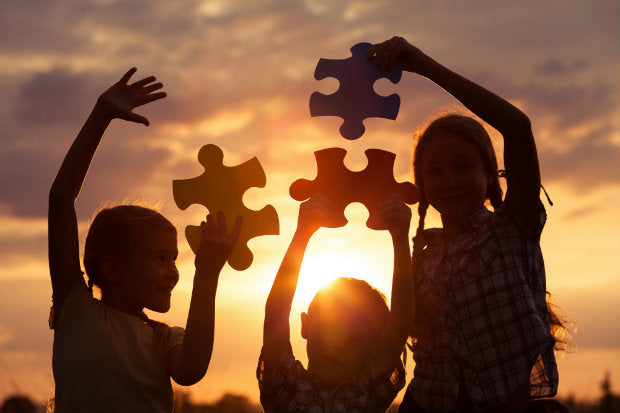" Beautiful children's games for togetherness "
Social interaction is usually a major challenge for our children. Even in kindergarten, the first conflicts have to be overcome and the little ones have to be able to say clearly what they want. These social skills and healthy self-confidence are important foundations for being able to cope with life independently later on. In this article, we show you how your child can learn more social skills with fun games.
Learning social skills through fun games
In today's society, social skills are extremely important. It is therefore invaluable for our children to be able to assess themselves as a person: How do I get on with my parents, classmates, playmates and other people in general, and how do I feel about myself?

Various games help to promote social skills
If a child has certain skills that make it easier to get along with other people, they will make friends more quickly and be able to cope with defeat much better. It is not enough to be talented and clever, because social learning is also an inevitable part of life. Skills such as the ability to work in a team, the ability to deal with criticism and conflict, communication skills and empathy make it easier for the next generation to cope with everyday life, and a certain amount of charisma also makes certain tasks much easier to solve. Good self-awareness and self-confidence are just as important.
Even if, admittedly, not everyone has these skills from an early age, some skills can certainly be learned. Even at kindergarten age, children's social skills can be promoted through various children's games. In the following lines, we will show you which children's games make an excellent contribution to social interaction.
8 fun games for social skills
1. a bracelet for the new best friend
In this game, the children form groups of two. In each group of two, only one of the two children makes a bracelet. However, the bracelet they make is intended for the other child. The other child therefore only tries to exert influence with the help of looks and gestures and to show which beads they prefer on the string, whether they want bells or their name with letter cubes in the bracelet. The other child can then do the craft. The larger your selection of craft materials, the more fun it will be to make things for each other. Many motif beads and different colors allow the crafter to learn a lot about their partner. They can reveal favorite colors, animals or sports.

2. the web of connectedness
All players sit in a circle. The first player names one thing they like, such as a toy or something to eat. Then everyone who also likes this thing comes forward. The child narrator now strings threads of wool to the other players who have come forward. Each player plays the storyteller once. When you look at the net of wool at the end, you realize that all the children actually have more in common than they perhaps thought. This game strengthens the sense of belonging. The children realize that despite different languages and cultures, people hardly differ from one another.

Expressing solidarity
3. stork's nest
This game encourages interaction within the group. You will need an empty bottle and several packs of matches. The players sit in a circle. A bottle is placed upright in the middle. Now the players must each take it in turn to place a match on the edge of the bottle. The structure is now raised together, which of course requires an increasingly steady hand. If the nest collapses, the game is over. Make sure that the children use the matches to play, but not the matchbox!
4. donkey drive
The players form pairs: one player is the donkey, the other the donkey driver. The donkey driver's job is to bring the donkey back to the stable. The game master now secretly instructs each donkey what action to take to drive it into the stable, for example by pulling, praising, stroking, pushing or pressing. The donkey driver has to find out which option the donkey likes so that it can be driven back into the stable. This teaches the players how to better adapt to other people.
5. melting ice floes
There are one or two tables in the room. Each player is given a chair so that they can sit anywhere in the room. The chair represents the ice floe, which slowly but surely begins to melt. The group must try to get to the island (tables) together without their feet touching the ground. This not only trains coordination skills, but also involves working together to solve the problem.

Promoting social skills
6. blind listening
Each player chooses a random place in the room, everyone closes their eyes and remains completely silent. At some point, the first player calls out the number 1 so that the next player can continue counting with the number 2 and so on. The participants have to count together until they have reached 30. What sounds easy is actually quite tricky. Only one player is allowed to talk at a time. Unfortunately, nobody knows who will open their mouth next or not. If two players say a number at the same time, the game starts all over again. Good communication is essential for this children's game.
7. sweater rally
You will need a large, old sweater for this game idea. The first player puts it on on command and immediately grabs the hands of another player. Everyone else now helps to put the sweater on the second person without letting go of each other's hands. How long does the team need until the last player has put on the sweater?

Children playing together
8 The robber in the museum
Two museum guards and a robber are chosen. The guard must not know who the robber is. All the other players are sculptures in a museum hall. They take up a position in which they can remain for as long as possible without moving (sitting, lying, kneeling, etc.). The robber now sneaks through the museum and wants to steal the sculptures, but he is disturbed by the museum guards, who now enter the room. The robber adopts a certain rigid posture to disguise himself and pretends to be a sculpture. Unfortunately, he doesn't manage to stay in this position for long and so he keeps changing a few little things about himself. Can the museum guards catch the thief?
Conclusion: games for social skills
There are many ideas for cooperative games that are easy to put into practice and that will help you to strengthen your child's social skills. The games mentioned above help to gain important experience and are important for children's social learning. Your child will learn to build trust, express themselves better, stick to agreements and follow important rules. In addition, games for social skills strengthen your child's self-confidence and self-awareness.










